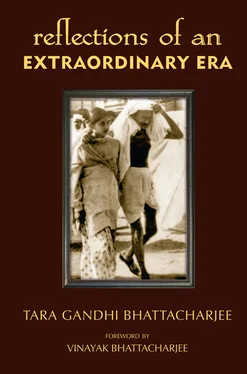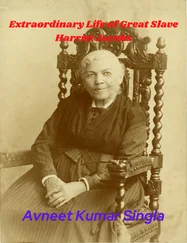But my childlike mind was also witness to the cruel reality of this mode of conveyance. The sound of the whip being used on horses tied to the carriages carried over to us on the second floor and would disturb and sadden me greatly. I felt a silent pain surge within me. Man’s cruelty to animal and society’s acceptance of this cruelty was my introduction to the harsh reality of life.
The beauty of truth also strongly influences a child’s consciousness. The smell of wet earth, the sight of those lamps lighting up one by one – even after all these years, these memories are vivid in my mind.
I have an unforgettable incident to narrate from that time. Like all little girls, I was also very fond of dolls. Below our flat were the newspaper office and the press. A carpenter used to work there. Father used to praise the carpenter, Nanhe Mian, a lot. One day I went to him with my doll. I almost ordered, ‘Nanhe Mian, please make a swing for my doll.’
‘Sure. I will.’ Saying this, he collected some pieces of wood, and before you knew it, he had put together a beautiful swing. His sincerity and dedication are forever etched on my mind. Today, I see Nanhe Mian as a sculptor carving a statue. For the wish of a young girl, the sculptor put in all his ability, creativity and dedication. It is also possible that through his art Nanhe Mian also tried to express his gratitude towards my father. Children capture all nuances. In the hammering of those pieces of wood, my little heart could hear the carpenter’s inner thoughts. It was like a dream come true when that little swing was ready and I picked it up with both my hands.
‘You won’t get it today, little girl. I will varnish it and give it to you tomorrow,’ Nanhe Mian said, smiling. In his voice, there was the excitement of seeing to completion a job well done. And in those words of the dedicated craftsman was also an advice to be patient.
My love of dolls outlasted my adolescence and youth, and persists even today in old age. My lifelong association with dolls and its stories always begin with the memory of Nanhe Mian. You may wonder how I remember the incidents of my childhood and youth with such clarity. Even my mother used to be amazed at my memory. But this natural power that I have is not extraordinary. Some people talk of their lives at the age of one and two! Some memories of the long gone past, of people, and the ambience of times gone by are still intact in my memory.
A few decades later, I was invited to a programme to felicitate Shri Viyogi Hari-ji in the ashram at Harijan Colony. I stood in front of our old home. Delhi had changed. Even that extension of Delhi was no longer rural. But that old house was just the same as it had been aeons ago when we had lived there. It was as if I had been transported back in time. I was the protagonist as well as the viewer.
I did not go inside. It was somebody else’s house now. I had no desire to find out how many families had made their home there. Those moments of the past, difficult to describe, frozen in time, are clear as crystal. The rural, pollution-free air of that era, the smells of cows, buffaloes, cow dung, wood stoves and raw earth had me in their spell. Then suddenly I remembered that there used to be a jungle in front of the house. I turned around to look, but the forest was no longer there. Then I looked in front of me. The house stood there, the same as before.
All of us children would go off into the jungle to play. Mother would stop us. We never went too far into the forest, but it would scare Mother nevertheless. It was difficult for her to understand the attraction nature has for children – how we longed to play in the lap of nature with full abandon. Once, when we came home after playing, I found Mother waiting for us – nervous, worried and worked up. ‘Listen, don’t go into the jungle to play, and if you hear a man laughing, don’t go investigating.’
‘Whose laughter? Which man?’ I asked.
‘It’s not a man.’ Mother explained. ‘It’s a hyena who laughs like a man. Children get taken in by the sound and go near it. The hyena lures little children and catches them.’
I can never forget how frightening those words were.
We used to come home covered in mud, and had to be cleaned up innumerable times a day. Just changing our clothes and keeping us clean would tire out mother so much. And when Dada and Dadi came to visit us, looking after them and attending to guests who came to meet them, while looking after us, must have been exhausting for Mother. Today I can only imagine how tiring it must have been for her. But the presence of my grandparents brought so much cheer that every day seemed like a festival. Bapu-ji would stay in our house at Harijan Ashram. Sometimes Ba would come and stay there alone, without Bapu-ji. We children would jump for joy on hearing the news of her arrival. There was a heavenly purity in the smell of sandalwood and sunshine that was an integral part of her body and her khadi sari with a coloured border.
Decades later, that day, as I stood before the house, all those memories from the past came flooding back to me. Mother’s voice, Dadi’s perfumed presence, the company of our cousins, Father’s busy life, his head shaking with worry (which did not leave my child’s mind untouched). Gandhi’s independence movement was at its peak. Independence was the unknown factor. Satyagrah was the known factor. Dada, Dadi, Nana, Tau, Kaka, Mama and all their companions were constantly in jail. Father would be jailed on and off for publishing news of the Satyagrah. Amidst all this, Mother and Father remained focused on our upbringing.
In our small house, we did not have a fresh-water tap and we probably didn’t have electricity either. But there was definitely a traditional luxury. Today when I think about it, it seems to be totally feudal in nature in the context of Gandhian philosophy. In one of the rooms, there hung from the roof a khadi curtain, which was one-fifth the height of the walls. On one corner of the curtain was a rope that hung to the ground. On moving the rope up and down, the curtain worked as a fan. As far as I can remember, this comfort had turned into a plaything for us children. I vaguely recollect a young boy, who was employed to help in the house, swaying the curtain-fan. I also vaguely remember that Father thought of it as a necessary evil. Perhaps he had installed the fan for Ba’s comfort; in his desire to serve Ba, he could pull that rope all night. The fan must have been there for Mother’s comfort as well, because mother suffered from illnesses like pneumonia and pleurisy in those years. Today such fans seem to have become a symbol of our cultural heritage, out on display at exhibitions.
Made and run by hand, this useful apparatus was a symbol of our exploitative society – a society for whose upliftment Mahatma Gandhi worked so hard. Anyway, it is true that even sixty-four years after Independence today, we haven’t taken any concrete steps for the rehabilitation of the downtrodden. The cord of the fan has in its various forms tied us down.
I remember Mother working hard all the time. She would take care of all the kitchen chores. If I can’t quite visualize my mother squatting on a low stool in front of a wood stove, it is not because my memory has faded; it must surely be the smoke from the stove that makes the picture hazy.
I once told mother, ‘You would do a lot of work in the Harijan Ashram.’
Mother said, ‘I was young then. I could easily manage the sweeping, mopping, washing the clothes, doing the dishes.’ Her burden would increase because of visitors. ‘I used to get upset only because having guests meant less time for kids,’ she added.
‘But yes,’ Mother reminisced, ‘when I used to fall ill, Bapu-ji would send Ba to look after you children. Ba would never stay away very long from Bapu-ji, but she wouldn’t leave you kids until I recovered completely. Neither did you leave her alone for a minute.’ Recently I found a letter written by Bapu-ji to Mother. In that short note, written in 1935, Bapu-ji tells Mother that if Tara is very ill, Ba is willing to go and look after her.
Читать дальше












